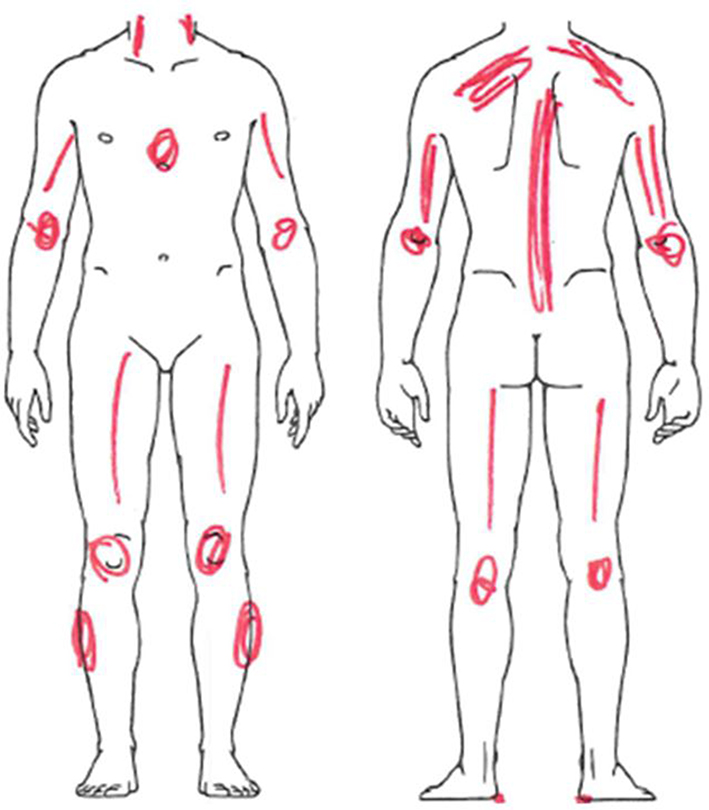Fibromyalgia
what is fibromyalgia?
Fibromyalgia is a complex condition that presents primarily with chronic widespread muscle pain. It is also associated with multiple other symptoms, including fatigue, sleep disturbances, cognitive dysfunction, stiffness, and episodes of depression. It tends to be seen more often in women.
Fibromyalgia may be associated with a number of other conditions that may involve central sensitisation, such as chronic fatigue syndrome, irritable bowel syndrome, irritable bladder syndrome(interstitial cystitis), temporomandibular joint disorder (TMJ), tension type headache, anxiety and depression.
The widespread pain and fatigue associated with fibromyalgia can be debilitating, and can leave otherwise healthy people struggling to find a way to cope with their daily lives.
Up to 5% of the adult population in the UK may suffer with fibromyalgia at any particular time. The condition may develop after a physical trauma such as a road accident, surgery, or infection, or after significant and prolonged psychological stress, such as a bereavement. In other cases however, symptoms may gradually accumulate over time without any obvious triggering cause. Treatment of fibromyalgia involves a team effort between practitioners and patient.
what are the symptoms of Fibromyalgia?
The pain associated with fibromyalgia is usually described as a dull ache in the muscles which can vary in intensity. Unfortunately the level of pain can often be very intense. Muscles can feel sensitive and sufferers feel pain more easily. The pain is associated with 18 points on the body, which, for most sufferers is essentially from ‘head to toe’. These painful spots, known as trigger points, are especially sensitive. Trigger points are usually found around the shoulders, neck, upper chest, elbows, hips, and knees.
As well as living with constant pain, individuals with fibromyalgia often experience tiredness, poor sleep, and restless legs. This constant fatigue and sleep disturbance tends to aggravate the pain symptoms and can also affect mood. This may lead to a downward spiral or ‘vicious circle’ of pain and anxiety. The depression and anxiety can also be compounded by frequent headaches, memory issues, TMJ pain and irritable bowel syndrome.

treatment of fibromyalgia
Treatment of fibromyalgia begins with developing an understanding of the nature of your pain. Your assessment begins with a comprehensive pain and medical history review as well as a physical examination. This allows me to make a thorough assessment of your pain and tailor a treatment plan to suit your individual needs.
Treatment options will include:
- A full explanation of fibromyalgia
- Medication review – Anti neuropathic drugs have been shown to be effective in management of pain as well as sleep distrubance in fibromyalgia. These drugs include tricyclic antidepressants and the gabapentinoid antiepileptic drugs. The current trends in prescribing is to move away from strong prescription pain killers for this type of pain.
- Psycho-therapy and cognito-behavioural therapy involving relaxation techniques, such as mindfullness, as a part of multidisciplinary approach, can help in managing the pain. This can lead to less dependence on drugs and health care professionals.
- Injections are rarely a viable long term solution for fibromyalgia but can be considered in the short-term to give ‘a window of opportunity’ to begin mobilising and improve muscle tone. Options for injections include trigger point injections with either cortisone or botulinum toxin. Trochanteric bursa injections with cortisone also may be offered to reduce hip pain and improve mobility and sleep.
While there is no cure for fibromyalgia, a variety of medications can help control symptoms. Exercise, relaxation and stress-reduction measures also may help.
Other treatment options that i can organise, depending on your needs may include:-
- Multidisciplinary treatment comprising
- Specialist physical therapy and rehabilitation
- Clinical psychology which includes techniques such as mindfulness and acceptance and conditioning therapy (ACT). Learn more about these techniques (here) and (here). This can be considered on an individual basis by appointment or in a group setting via a pain management progamme*
More Info on fibromyalgia
Fibromyalgia Support Northern Ireland – Local Northern Ireland support and information group
Fibro Ireland – Support and resource site based in Ireland
Fibromyalgia UK – Support and resource for the fibromyalgia sufferers in the UK
Belfast Rheumatology Group – if you need to see a rheumatologist
ENFA (European Network of Fibromyalgia Associations)
The Pain Toolkit – Useful resource for fibromyalgia
Managing fibromyalgia with mindfulness – Interesting introduction to mindfulness
Versus Arthritis – Amazing organisation – very active in the community.
Other frequently seen chronic pain conditions
I am happy to consult on a number of other chronic pain conditions, including:-
- Spinal Pain (Low back or neck)
- Chronic headache (Including chronic migraine)
- Sciatica
- Fibromyalgia
- Neuropathic Pain (Nerve pain)
- Sacroiliac Joint Pain
- Widespread joint (Arthritic) pain
- Myofascial Pain (Muscle pain)
- Trochanteric Bursitis
- Knee Pain
- Chronic Facial Pain
- Post Surgical Pain
- Trigeminal Neuralgia
- Whiplash Injury
- Post Hepretic Neuralgia (Shingles pain)
- Adhesive Capsulitis (Frozen Shoulder)
- Chronic Abdominal Wall Pain (ACNES)
- Coccygeal Pain
- Painful Diabetic Neuropathy (PDN)
- Plantar Fascitis


